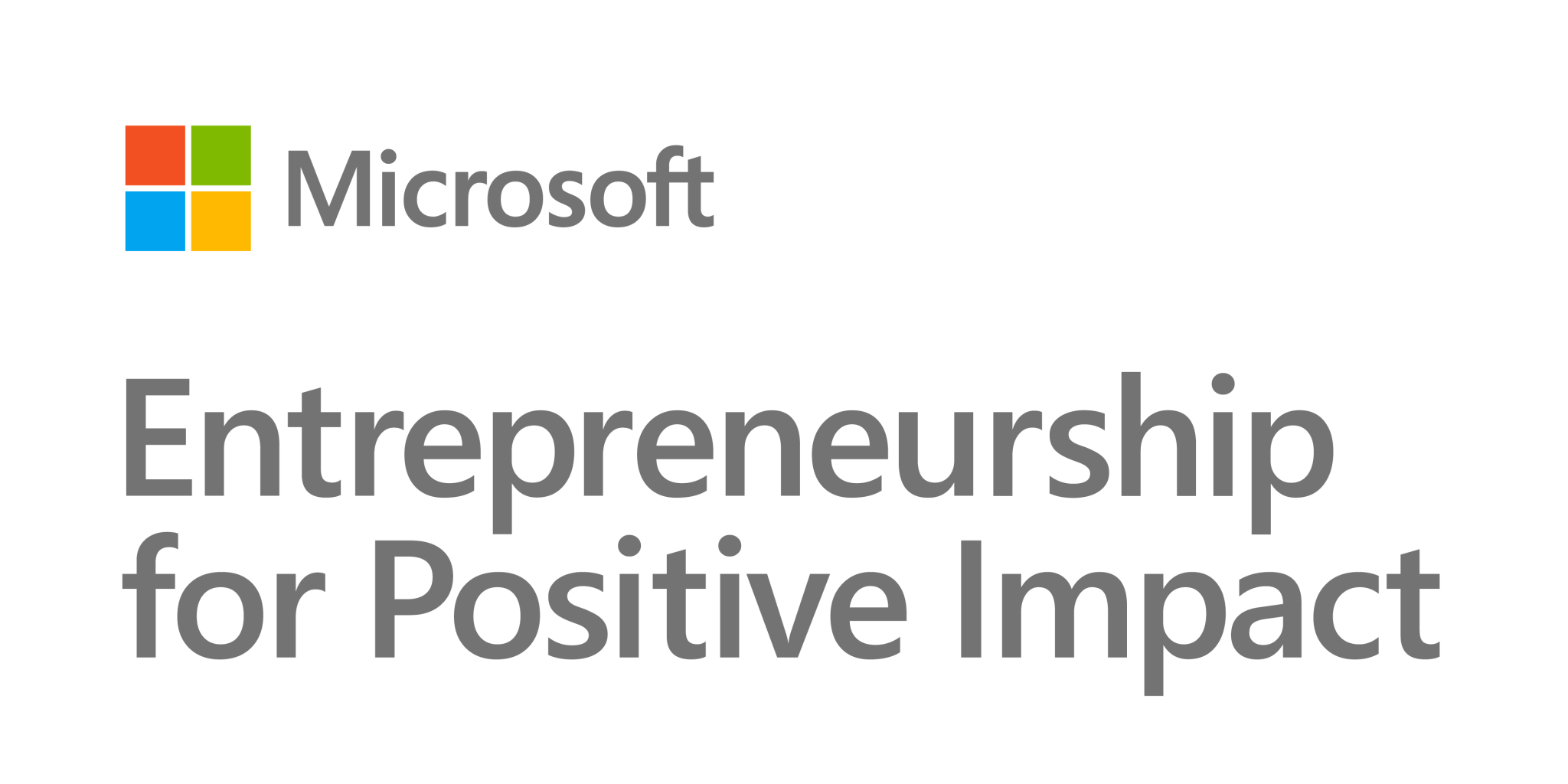For startups, collaborations can be the key to raising money, gaining invaluable expertise and finding new customers. And in a tricky economic climate, they are more valuable than ever.
But knowing how to collaborate and who to take the plunge with is a big decision - particularly for impact startups which have lofty goals that could make significant positive changes for millions of people around the world.
“Collaboration plays a pivotal role in the success of impact startups,” Anthony Virapin, worldwide leader of Microsoft’s Entrepreneurship for Positive Impact, tells Sifted. “These startups create incredible social innovations that deserve visibility. By working within an ecosystem of other actors, they can seize opportunities for international exposure and connect with peers. This connection allows them to gather invaluable feedback, ideas and opportunities for growth.”
Microsoft's Entrepreneurship for Positive Impact initiative, a programme with over 1.8k entrepreneurs from 94 countries, is designed to facilitate the work of impact startups. By supporting these startups, Microsoft positions itself as a long-term partner in their journey, opening up future business opportunities.
And it’s a win-win. “Connecting impact startups with Microsoft's existing customers helps these larger corporates with their digital transformation and ESG strategies,” says Virapin.
Here’s why impact startups need to collaborate even more - and what they can gain from partnerships.
Choosing a collaborator
Emily Will is the EY global impact entrepreneurship leader. The EY organisation (one of the 'big four' accounting firms) and Microsoft are seeking to build an inclusive digital economy by providing training and skills development opportunities — to support millions of people to enter or re-enter the workforce or build new businesses by 2025. Will says for collaborations to work with impact startups, all partners should have the same values.
“It’s important to find a corporate partner who not only provides resources and extended capabilities, but also shares values and a vested interest in delivering societal impact,” she says. “Startups can conduct due diligence on potential partners' impact track records and engage in transparent conversations about mutual goals.”
Due diligence is also highlighted as an essential step in the selection process by Johan Attby, general partner at Norrsken Accelerator, another Microsoft partner. Attby says the organisation you are collaborating with must have the relevant expertise – if the person or company hasn't personally built something similar or solved the problem that they're facing, they’re not the one for you.
Collaborations should aim to unblock obstacles such as funding needs, regulatory constraints or challenging market entries.
“It's very different scaling a company from zero to €1m in revenue versus €10m to €100m,” Attby tells Sifted. “If an advisor hasn’t worked on the same scale, they’re very likely not the right fit.”
However, he adds that some knowledge needs to be fresh.
“If their experience is from ten years ago, it might not be relevant anymore – for example, if you're building a B2C company or you're talking go-to market strategy, it's vastly different today than it was a decade ago,” he says.
Attby also flags the importance of making a fair assessment of where your founding team needs support before entering collaboration conversations.
“Assess your strengths and weaknesses and ask yourself where you have weaknesses, is this an area where you should hire?” he notes. “Is this an area where you should collaborate with someone, bring in an adviser or bring in a mentor? Do the homework first.”
Some collaborators may be able to provide support in multiple areas – Microsoft, for example, provides tech support, mentoring and coaching, policy environment support, community connection and go-to market assistance via its initiative.
“Collaborations should aim to unblock obstacles such as funding needs, regulatory constraints or challenging market entries,” says Virapin. “Additionally, they should create new development opportunities such as international expansion, leveraging AI and technologies for hyper-scale or recruiting specific talent profiles.”
Mutual benefits
Through EY Ripples, the EY global corporate responsibility programme, the company has brought their skills and knowledge together to help impact entrepreneurs around the world achieve greater scale and impact.
Collaborating with corporates can open doors to venture capital, impact funds, critical resources and technological capabilities.
In East Africa, for example, Jibu has set up a network of locally owned franchise businesses, which it equips and capitalises with water treatment systems and other technology to clean locally sourced water which can be sold at more affordable prices to the communities.
When Jibu sought to expand rapidly, EY teams helped it to organise its financial and operational controls into a playbook which all stakeholders in the business could use. Jibu now has 180 franchises across eight countries that have distributed nearly 591m litres of safe water to their communities.
“Collaborating with corporates can open doors to venture capital, impact funds, critical resources and technological capabilities,” says Will. “It can give impact startups access to new markets and global connections that can put their mission on the world stage.”
Will says these relationships are mutually symbiotic, helping enable innovation and access to groundbreaking market-led solutions that address social and environmental challenges, enhancing corporate brand value and meeting ESG goals.
‘The right thing to do’ — for business and society
This is a perspective shared by Unilever, who launched impact accelerator TRANSFORM in 2015 to unite corporates, donors, investors and academics to support visionary impact enterprises across Africa, Asia and beyond.
The accelerator is a joint initiative between Unilever, the UK’s Foreign, Commonwealth & Development Office (FCDO) and EY.
“TRANSFORM provides grants and business support to impact entrepreneurs to help them test and scale their solutions,” Grace ter Haar, sustainability manager at Unilever, tells Sifted.
“TRANSFORM is all about collaboration and bringing these different organisations together to scale impact startups who have the solutions that the world needs. We can then connect Unilever, the FCDO, EY and others with the innovators on the ground who have the agility, local market knowledge and innovation, and together create something very powerful.”
Ter Haar says corporates collaborating with impact startups is not only the right thing to do, but it's critical to build thriving environments for businesses and communities.
TRANSFORM works with Hasiru Dala, a social justice enterprise based in Bangalore, India. Hasiru Dala works to create better livelihoods for the informal waste collector sector by providing clean and responsibly sourced waste for the growing circular economy.
As in many Indian cities, there's a large informal workforce in Bangalore that plays an essential role in collecting plastic waste — primarily plastic bottles — to then sell to recycling plants. By collaborating with TRANSFORM, Hasiru Dala was able to increase its collection and segregation capacities. They were also able to upskill many more informal waste collectors, who are predominantly women.
In addition, the collaboration enabled Hasiru DalaI to become a supplier of recycled plastic for the packaging of Unilever’s Sunsilk hair products.
“Hasiru Dala went from serving three apartment blocks to now more than 430 clients, while also creating better lives for the informal waste collectors through stable jobs, fair wages and support for their families,” says ter Haar.
In the spotlight
During this year’s ChangeNOW event, Microsoft hosted its inaugural EfPI Cup attended by over 100 investors, corporates and key social innovators from around the world. This allowed its EfPI Cup finalists Earth Plus, Witty Works, MeVitae, FluxGen and Sopht to pitch their solutions to people who could potentially support them in their positive impact mission.
A lot of the changes we're hoping to see are beyond any single organisation's power. That’s where collaboration comes into play.
“Participating in incubation or acceleration programmes facilitates collaboration, offering startups the chance to further their impact and scalability at a much faster pace,” says Virapin. “We believe this ecosystem approach is beneficial for all, multiplying the potential for positive outcomes.”
Daniel Nowack is head of the Schwab Foundation's Global Alliance for Social Entrepreneurship at the World Economic Forum. With partners like Microsoft, Unilever or EY, it brings together stakeholders from different sectors and areas of expertise to drive an economy that serves people and the planet.
“A lot of the changes we're hoping to see are beyond any single organisation's power,” says Nowack. “That’s where collaboration comes into play.”
Greyston Bakery is an awardee of the Schwab Foundation and pioneers the open hiring principle, meaning anyone who wants a job can show up and it's first come, first serve basis – there are no CVs and there are no background checks, which omits any bias in the hiring process.
The enterprise has collaborated with large organisations like IKEA, which has adopted the open hiring principle to fill thousands of jobs around the world.
“The AI for Social Innovation initiative is bringing together social innovators, technology leaders, companies and public sector actors,” says Nowack. “The project was inspired by over 30 leading innovators, co-initiated by Microsoft, and is supported by EY. It highlights how collaboration can scale the successful implementation of AI for impact, create a dialogue between innovators and tech leaders, and address challenges such as bias or accessibility.”
Microsoft would like to encourage technology leaders and impact startups to join the AI for Social Innovation initiative here.
Disclaimer: This publication contains information in summary form and is therefore intended for general guidance only. It is not intended to be a substitute for detailed research or the exercise of professional judgement. Member firms of the global EY organisation cannot accept responsibility for loss to any person relying on this article.





